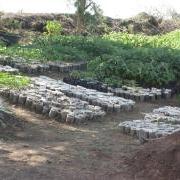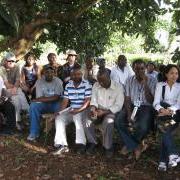Short Term Projects
 The current funding for the BESSA project includes allowances for a number of pilot projects that will:
The current funding for the BESSA project includes allowances for a number of pilot projects that will:a) provide empirical data;
b) a better understanding of socio-ecological processes;
c) promote knowledge sharing and;
d) and establish monitoring to enable adaptive management.
To meet these needs the BESSA project is undertaking research that will provide a locally lead situation analysis of the links between ecosystem services in a catchment, in terms of producers and consumers, the conflicts, the drivers for any change in these services and the potential management options to halt and restore the degradation of these services, and therefore improve human well being. Within this overall framework, we have identified 3 principal sub-projects, comprising:
1. Relationships between land use / management and ecosystem services
2. Opportunities for change to improve livelihoods and alleviate poverty through payments for ecosystem services
3. Overall synthesis: The information from the projects together with the data and information already available from PRESA will be used and mapped against the four research gap needs listed (a-d above) as prioritised by the sponsors
This information from the projects we would expect to pull together into a paper / papers for publication in journal article(s) and on the basis of the gap analysis propose future research needs and work into a full NERC/DfID proposal (more info soon).
Two 3 month MSc projects affiliated with the BESSA project have been started at the University of Aberdeen and will be complete in mid-August, 2009. This work is funded by the MSc programme at University of Aberdeen, but affiliation with BESSA provides added value to BESSA and provides contacts and experience to the MSc projects.
The first project focuses on reforestation of the Uluguru mountains, and the second considers assessment of land capability in semi-arid Africa, focussing on sites in Sasumua, Kenya.
Reforestation in the Uluguru Mountains, Tanzania.
How can environmental goals be achieved without a decline in farmer income? One option to reduce erosion from previously deforested mountain slopes is reforestation, but can farmer income be maintained given the reduced area of land available for crop production? This project will investigate whether income can be maintained through tree related products. The work will review current land use and tree species that are suitable for planting in the Uluguru mountains including information on growth characteristics, plant inputs to soil, soil C under trees, potential products, income from products, and costs of establishing trees. This information will be used to calculate C sequestration in soil under different species, total C sequestration from change in soil C plus C in trees, costs to farmer (loss of income from previous crop - potential income from different tree species), and C sequestration / costs over time period 0-100 years. The potential for C sequestration, difficulties of implementation etc will be discussed.

“Land Capability for Agriculture" in semi-arid regions of Africa.
Within a rapidly increasing population, the natural resources of Africa will need to be managed more effectively to support human demands for food, water and other ecosystem services. Highest priority amongst these is ensuring that food production can be maintained and ideally expanded as new policies and development strategies are implemented. The objective of this study is to evaluate whether the Scottish Land Capability for Agriculture rule-based model can be transferable to the African context, and what environmental, management and other data is required to implement it at multiple scales – catchment, regional and multiple-scale analysis. For the Sasumua region in Kenya, the LCA model will be developed using available data. Opportunities to improve capacity based on changing environmental properties will be explored.


